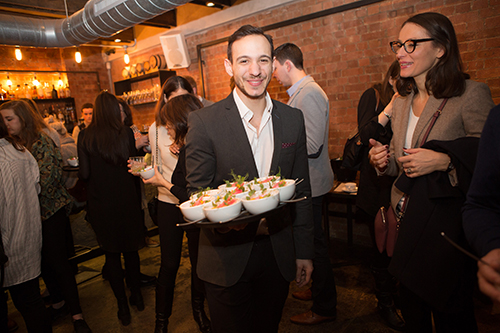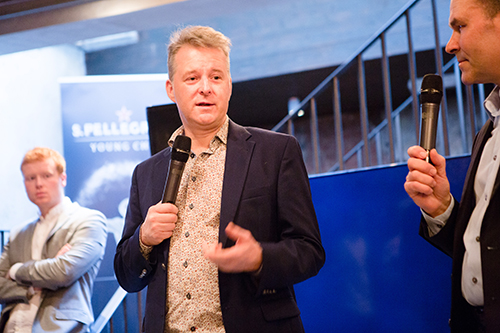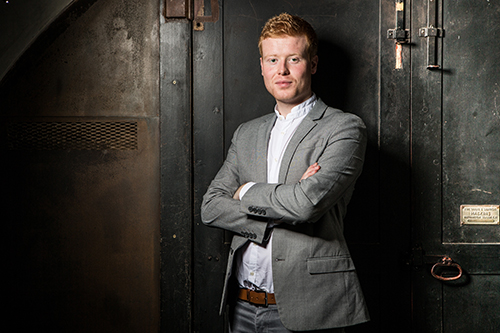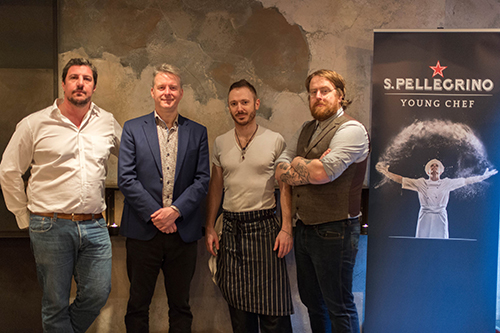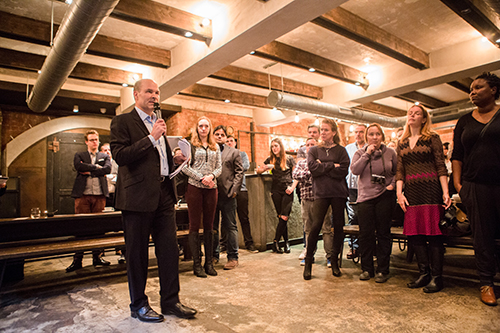S.Pellegrino Young Chef: Ollie Dabbous and Claude Bosi on nurturing chef talent
Michelin-starred chefs Ollie Dabbous and Claude Bosi are judges and mentors at this year's S.Pellegrino Young Chef 2016 competition. They talk to Lisa Jenkins about how to encourage young chef talent into the industry, how to retain and nurture them, and what they are doing to address the skills shortage
Claude Bosi, chef-patron, Hibiscus, London
Claude, what's your advice to young chefs coming into the industry?
Out of about 100 young chefs, we get about 10 who really understand what it's about, and it would be nice if we could get to 50%. Parents should help young students understand reality. Sometimes you can be too protective of your child and hide things from them.
When I told my dad I wanted to be a chef, he took me to mum's kitchen and she said, "What the hell are you thinking?" My parents always told me I had their support, but they made sure I knew the truth about life in a kitchen.
If you choose to be a chef, you have to do it properly. I remember once, during my training, I went home to my dad after a shift and said, "F**k that!" He said, "Son, you've started it, so you will finish it." He took me back there himself the next day.
We get lots of applications at Hibiscus. Although some people look good on paper, we can only really test them properly in the kitchen - they have to have the right attitude. The best ones usually have a job during the day and will come in at night to learn, or they work with us during the day and they come and do a night shift too. You can normally tell. They will look the part and have a real hunger.
Do you think we have a skills shortage in the UK?
I don't think we have a shortage of young people wanting to be chefs, but there is a shortage of young chefs with the right attitude to survive, who understand the hard work and can perform to high standards every day.
Breakfast at Dabbous
How can we encourage them to have the right attitude and stay in the industry?
We have to motivate them by what they learn at work - being rough with someone is not motivation. Motivation is saying to someone: "You've been doing that perfectly for the last three days, why did you decide to not do it properly today?" It's about them.
We are lucky that people come to our restaurant and give us their money and we can't take them for granted. I ask the chefs, "Would you pay for that?"
For me, it is about self-discipline, making sure you do it right every day. You have to check yourself constantly. I do. If you don't check yourself, standards will slip and you will move back in the queue and I don't want that. I'd like them to have that mentality.
Why did you recently reduce your number of services and staff hours at Hibiscus?
This was about motivating and retaining staff. We'd got to the point where we had 15 of us in the kitchen and the same out front and we were having to take chefs on just to cover days off and sometimes, to be honest, we were employing monkeys.
We didn't want part-time staff, but we were all exhausted. I decided that I'd rather just have 10 chefs who want to do it, rather than having 15 chefs and five of them are monkeys. It's about having the right people for fewer hours.
By doing this, the team get Sunday and Monday off, they come to work at 3pm on Tuesdays and Wednesdays, and they are happy. It means on a Friday and Saturday night the team actually have some life in them.
When I told them about the new hours, it was like Santa Claus had arrived! It was fantastic, but they know that in the days we are in the restaurant they have to give 200%.
Ross Lewis, Chapter One
Why are you involved in the S.Pellegrino competition?
The competition helps move chefs forward and I will be a part of that process as a mentor for the UK and Ireland winner - it's a big responsibility. I will be very honest, possibly that will be painful at times, but I will try to guide as much as I can.
I just hope that the winner doesn't think they are better than they are, because it's just a competition. I will try and keep them grounded, because egos can kill a chef. At 23 or 24 they still have their whole life ahead of them.
Now that we have changed the hours at the restaurant I'm in a good place to give more back to the industry. I'm also older and more mature. What happened with Sat Bains last year was a real wake-up call for a lot of us - that we shouldn't take anything for granted. Sat and I are friends and when we heard the news about the earthquake in Nepal we all panicked. It was very scary.
I won't be climbing any mountains - but I'd like to do more with mentoring young chefs and I want to do it properly.
What sort of winner are you looking for?
Someone humble, who thinks they are lucky to win and someone with the hunger to do well. Someone with determination, who won't waste the opportunity, and hopefully they will be able to handle feedback, too.
Mark Moriarty, the inaugural global winner, who represented the UK and Ireland
Ollie Dabbous, chef-patron, Dabbous, London
How do you encourage young chefs in your kitchen?
If they work here, they change sections every six months so they always see something different - they don't just get stuck. We encourage them to eat out - that's key as well for a young chef. We get a lot of CVs, but once we've found a good one, the trick is to try and retain them, so we've always done a four-day week, with three days off.
It is a demanding job and the hours are long. A four-day week means you can sleep one day, do your laundry on another and then have a social day.
How does it compare to the environment you trained in?
It's changed a lot, but there's no right or wrong way. I'm glad I went through the mill a little bit because it's made me who I am and it forges your character, but at the same time some of that stuff in the past is a bit Dickensian and it doesn't have to be that way.
Do you think there is a skills shortage?
Not in terms of numbers - it's more whether they have the skill set. A lot of young chefs assume they are at chef de partie level too soon. This used to mean that you could cook in any section and it was something to strive for, but maybe the title is given too early nowadays - you used to have to earn your stripes.
However, there are a lot more restaurants now, so there is so much more to choose from at different levels.
Is it a big responsibility to motivate staff?
More than anything, I just want a level of enthusiasm from them; for the team to be proud and to be demanding of themselves.
I always say to them when they are cooking a dish, "You're not doing this for me or to placate me, you're not even doing it for the customer, you're doing it for yourself, and you must have that level of pride".
It's my responsibility to shape the company and demonstrate a level of respect. We don't have any unnecessary shouting, we have recipes for everything, we are methodical and we work with the best ingredients.
What's your responsibility as a judge in the S.Pellegrino competition?
Honesty mainly. I know what I like, but equally, even if a dish is not to my liking, I will be able to see value in it. It might be something that isn't stylistically aligned with my preferences, but you can still judge and deliver deserved praise for a good plate of food.
UK and Ireland S.Pellegrino judges: Claude Bosi, Ross Lewis, Ollie Dabbous and JP McMahon
The S.Pellegrino Young Chef 2016
The S.Pellegrino Young Chef 2016 is an international project dedicated to finding the best young chef in the world.
It divides the world into 20 regions and involves 100 top chefs as jurors, 20 young chef finalists and 20 chef mentors in an initiative that reflects S.Pellegrino's commitment to supporting emerging talent.
The 2016 competition will feature a new panel of judges, known as the Seven Sages, who will be responsible for crowning the most talented young chef in the world. The panel includes David Higgs, Carlo Cracco, Gaggan Anand, Elena Arzak, Mauro Colagreco, Wylie Dufresne and Roberta Sudbrack.
The application process is open until 31 March 2016, with young chefs required to submit their application and a signature dish. Phase two will see the young chefs divided into 20 regions and their applications assessed by the International School of Italian Cuisine.
Ten selected finalists from each region will move on to local finals, where live competitions will be held in each region from 1 May to 15 August. During these events, the area finalists will have to cook their signature dishes for a regional jury composed of independent top chefs. The 2016 UK and Ireland judging panel includes Claude Bosi, Ollie Dabbous, JP McMahon and Ross Lewis.
By the end of August 2016, the 20 best young chefs from each region will be announced as the official finalists. Each finalist will be assigned a mentor chef: the UK and Ireland mentor chef will be two-Michelin-starred chef and owner of Hibiscus, Claude Bosi.
The grand finale takes place on 13 October in Milan and consists of a two-day cooking competition in front of the international panel of judges.
For rules and an application form, visitwww.finedininglovers.com/sanpellegrinoyoungchef2016



